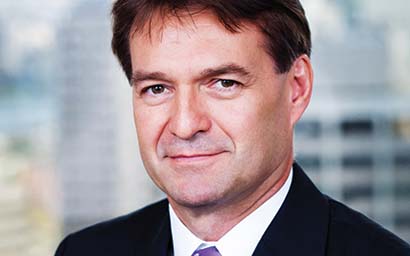Milestone Group’s chairman Geoff Hodge talks to Funds Europe about the pandemic’s long-term impact on the industry.
Covid-19 had a significant impact on the asset servicing community as volumes spiked and home environments became makeshift offices seemingly overnight. It exposed some cracks in their collective systems and the need for a rethink of their value proposition. However, the pandemic cannot be blamed for all their problems. It only served to accelerate the trends already in motion.
“The industry from fund accounting to fund administration and custody is at an inflection point and needs to find a new way forward,” says Geoff Hodge, chairman of Milestone Group.
“Covid-19 caused people to work from home en masse in a short time frame and in some cases, firms found that their infrastructure was broken. However, change is not linear, and the pressure builds until one day it bursts, and the industry realises that it is time to change.”
Covid-19 though did put fund administrators to the test as the ensuing lockdowns caused volatility in stock markets to go through the roof in March. It unleashed unprecedented levels of transactions with many fixed income traders, for example, reaching for the phone to trade instead of their electronic pipes. In other quarters, fair value pricing was more widely employed, interfering with the more automated net asset value processes, which in some cases, caused a delay in issuing a net asset value (NAV) calculation.
Soul-searching
When the dust settled and markets calmed down, asset owners and managers took an even closer look at their own cost base and value chain. This soul-searching had begun a while ago as competition in the industry increased and interest rates continued to bump along the bottom. They had already become more discerning of third-party providers and pushing back on prices and fees. This is only set to continue as the current monetary policy is not expected to change for the foreseeable future, which will further squeeze their margins.
This has and is resulting in a laser-sharp focus on core competencies and generating stronger investment performance. Horizons will be widened even more to include different markets but also asset classes, strategies such as alternatives and private debt as well as different fund structures. This requires different skillsets and services, but in general, they are looking for providers who can offer robust digital and innovative solutions, real-time data as well as improved data analytics. Also on the list are real-time NAV validation, regulatory reporting, fund accounting capabilities, and support for new products and services, especially in the burgeoning environmental, social and governance space.
Equally as important, they want providers who can be aligned with their different geographical locations as well as cater to different fund structures, whether it be pooled, passive, active, fund of funds or all the above.
Against this changing landscape, the traditional one-stop-shop outsourcing model is evolving. In its place is a more component-based approach where they can select a service that meets their specific requirements.
“Asset owners and providers do not want to be beholden to one provider and be locked into their technology or data warehouses,” says Hodge, who notes that around 60% of firms have more than one provider. “Historically, fund administrators were seen as technical centres of excellence and operational efficiency, but that is not the case today and they are struggling to generate acceptable returns at current process for these services on a standalone basis. It is also not easy for them to differentiate, because a large number have the same products, systems and key performance indicators.
Upping their game
One of the challenges, according to Hodge, is that the fund administration package is becoming commoditised and its reliance on custody and other parts of the business to subsidise the function is predicted to come under pressure. These functions include the more lucrative niches in stock lending to FX, cash balances, collateral and liquidity management.
Administrators have been trying to up their game in both products and operationally. They have tried to rationalise their infrastructure as well as add more enhanced services such as oversight, product design, data management, performance reporting and distribution insight. However, it is an expensive undertaking, especially for the smaller to medium-sized players.
Hodge believes that a better path forward would be for fund administrators to forge ties with technology firms to provide solutions for clients under one umbrella in a cloud setting, connected through APIs.
He is aware, though, that this may not be an easy sell. “This will also mean a change in mindset to the traditional way of doing business,” he adds. “I do not think we need a utility type of model, but there is a case for more strategic partnerships and collaboration to offer best-of-breed solutions.”
Hodge pointed to SWIFT, or the Society for Worldwide Interbank Financial Telecommunication, as a good historic example of different sections of an industry coming together to solve a problem – in this case, cross-border payments. Established in the early 1970s, 239 banks from 15 countries joined forces to launch a messaging service to replace the Telex technology that was then in widespread use. Today, the remit has expanded, and it spans every continent and services more than 11,000 institutions around the world.
Whatever shape the outsourcing takes, Hodge notes that the pandemic has highlighted the need for greater oversight of third-party providers. Handing over certain functions is one thing, but that does not mean abdicating responsibility. Firms need to be accountable and ensure that their providers have the operational resiliency, robust infrastructure, processes and people. This is not only good practice but also increasingly a regulatory expectation, to have contingency plans in place for any breaks in the supply chain or interruptions to business-critical outsourced arrangements.
© 2020 funds europe





